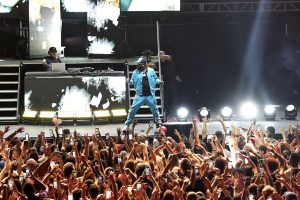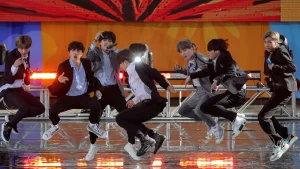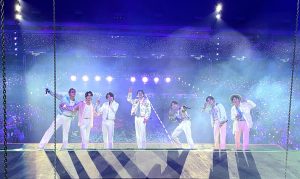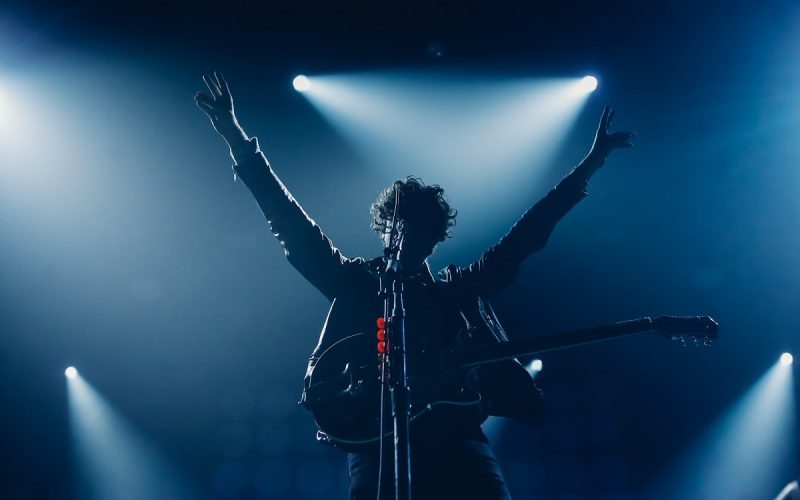Introduction
The concert industry, a cornerstone of the entertainment world, has been undergoing a significant transformation, driven by technological advancements and changes in consumer behavior. The emergence of hybrid and virtual concerts is reshaping how audiences experience live music, offering a blend of in-person and digital interactions. This article delves into the future of concerts, focusing on the rise of virtual experiences and the integration of hybrid models, exploring their implications for artists, audiences, and the industry at large.
The Evolution of Concerts

-
Historical Context
Concerts have long been a communal experience, bringing people together to enjoy live performances. From classical music recitals in grand theaters to rock concerts in sprawling arenas, the essence of concerts has been the shared experience of music. However, the advent of the internet and digital technology has gradually introduced new ways of consuming music, setting the stage for a paradigm shift in live performances.
-
The Digital Age
The digital age has democratized access to music, allowing fans to stream their favorite songs and watch music videos online. Platforms like YouTube, Spotify, and Apple Music have revolutionized the music industry, providing artists with new avenues to reach global audiences. This shift has naturally extended to live performances, with artists experimenting with live streaming concerts and virtual events.
The Rise of Virtual Concerts

Image by: Google.com
-
Technological Enablers
Virtual concerts leverage various technologies to create immersive and interactive experiences. High-speed internet, virtual reality (VR), augmented reality (AR), and sophisticated streaming platforms have made it possible to deliver high-quality virtual concerts. These technologies enable artists to perform in virtual venues, interact with fans in real-time, and create visually stunning experiences that go beyond the limitations of physical spaces.
-
Benefits of Virtual Concerts
- Accessibility: One of the most significant advantages of virtual concerts is accessibility. Fans from around the world can attend a virtual concert without the need for travel, making it easier for artists to reach a global audience. This inclusivity is particularly beneficial for fans in remote or underserved areas who may not have the opportunity to attend in-person concerts.
- Cost-Effectiveness: Virtual concerts can be more cost-effective for both artists and fans. Artists can save on the expenses associated with touring, such as travel, accommodation, and venue rentals. Fans, on the other hand, can enjoy live performances without the additional costs of tickets, transportation, and accommodation.
- Environmental Impact: Reducing the need for travel and large physical gatherings also has a positive environmental impact. Virtual concerts can help lower carbon emissions associated with transportation and reduce the waste generated by large events, contributing to a more sustainable entertainment industry.
-
Challenges of Virtual Concerts
- Technical Issues: Despite the advancements in technology, virtual concerts are not without challenges. Technical issues such as internet connectivity problems, streaming lags, and audio-visual quality can affect the overall experience. Ensuring a seamless and high-quality virtual concert requires robust infrastructure and technical expertise.
- Lack of Physical Presence: One of the primary drawbacks of virtual concerts is the absence of physical presence. The energy and atmosphere of a live concert, with its crowd interactions and shared emotions, are hard to replicate in a virtual environment. Fans and artists alike may miss the tangible connection that comes with in-person performances.
The Emergence of Hybrid Concerts

-
Definition and Concept
Hybrid concerts combine elements of both in-person and virtual experiences. These events are designed to cater to audiences who prefer the traditional live concert experience while also reaching those who opt for virtual attendance. Hybrid concerts typically involve a live performance at a physical venue, which is simultaneously streamed online for virtual attendees.
-
Advantages of Hybrid Concerts
- Flexibility: Hybrid concerts offer flexibility for both artists and fans. Artists can perform live while also engaging with their virtual audience, creating a more inclusive experience. Fans have the option to choose between attending in-person or enjoying the concert from the comfort of their homes.
- Enhanced Revenue Streams: By catering to both in-person and virtual audiences, hybrid concerts can generate multiple revenue streams. Ticket sales for the live event, combined with virtual ticket sales, merchandise, and exclusive online content, can significantly boost an artist’s earnings.
- Broader Reach: Hybrid concerts enable artists to reach a wider audience. Fans who are unable to attend the live event due to geographical, financial, or personal reasons can still participate virtually. This broader reach can help artists build a larger and more diverse fan base.
-
Implementing Hybrid Concerts
- Venue and Technical Setup: Organizing a hybrid concert requires careful planning and coordination. The venue must be equipped with the necessary technology to facilitate live streaming, including high-quality cameras, audio equipment, and a reliable internet connection. Additionally, the production team must ensure that the virtual experience is engaging and interactive, with features such as live chat, virtual meet-and-greets, and exclusive online content.
- Marketing and Promotion: Effective marketing is crucial for the success of hybrid concerts. Artists and promoters must communicate the unique value proposition of the hybrid model, highlighting the benefits of both in-person and virtual attendance. Social media, email campaigns, and collaborations with influencers can help generate buzz and attract a diverse audience.
The Future Landscape of Concerts

Image by: Google.com
-
Technological Innovations
The future of concerts will be shaped by ongoing technological innovations. Advances in VR and AR will enhance the virtual concert experience, making it more immersive and interactive. Holographic technology could enable virtual appearances by artists in multiple locations simultaneously, further blurring the lines between physical and virtual performances.
-
Industry Adaptation
The concert industry will need to adapt to the changing landscape by embracing hybrid and virtual models. This adaptation will involve investing in technology, training staff, and developing new business models that leverage the benefits of digital platforms. Collaboration between artists, promoters, and technology providers will be essential to create seamless and engaging concert experiences.
-
Audience Expectations
As audiences become more accustomed to hybrid and virtual concerts, their expectations will evolve. Fans will seek high-quality, interactive experiences that offer unique and exclusive content. Personalization and customization will play a significant role in meeting these expectations, with features such as tailored setlists, virtual backstage access, and interactive fan experiences.
Conclusion
The future of concerts lies in the integration of hybrid and virtual experiences, offering a blend of in-person and digital interactions that cater to a diverse and global audience. While virtual concerts provide accessibility and cost-effectiveness, hybrid concerts offer flexibility and enhanced revenue opportunities. As technology continues to evolve, the concert industry must adapt to these changes, embracing new models and innovations to create memorable and engaging experiences for fans worldwide. The rise of hybrid and virtual concerts marks a new era in live music, one that promises to redefine the way we experience and enjoy performances.










